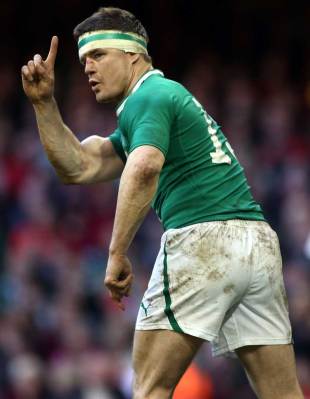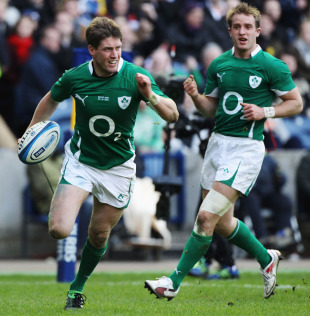|
Numbers Game
The extraordinary life of Brian
Huw Richards
February 12, 2013

Brian O'Driscoll scored his 26th championship try against Wales before making his 57th start against England
© PA Photos
Enlarge
It will doubtless, and quite rightly, figure somewhere behind the birth of his first child, the pain of defeat by England and a nasty-looking bang on the ankle, but it is worth noting that Brian O'Driscoll set yet another record at the Aviva Stadium on Sunday. It was his 57th start in a championship match, taking him past another name on the shortlist for 'Greatest Irish player ever', Mike Gibson, the elegantly versatile midfield back of the 1960s and 1970s. O'Driscoll has of course had the advantage of playing five matches per season during his career, so has got to his total rather more rapidly than Gibson, who took 16 seasons (1964 to 1979) to run up his total of 56 starts. And the real contrast can be seen in the win-loss stats. O'Driscoll has been a winner in nearly three-quarters - 41 - of his 57 matches while Gibson won only 22 times, with a further six draws. Irishmen rather dominate the upper end of this particular stat - John Hayes started more times, 54, than any other forward, while current marks for other nations were set by Philippe Sella (50), Rory Underwood (50), Chris Paterson (49), Martyn Williams (48) and Mirco Bergmasco (41). O'Driscoll however stands only second for championship caps, behind team-mate Ronan O'Gara whose appearance as a replacement for the injured Jonny Sexton was his 62nd in total, of which 41 have been starts. O'Gara too set a new mark on Sunday, since this was his 21st appearance from the bench, breaking a previous tie with Mike Blair and Salvatore Perugini on 20. The players who hold the national records for starts also dominate those for total appearances, with only O'Gara and Jason Leonard (54 games for England, five as a replacement) overtaking the top starters because of matches where they came off the bench. O'Gara was also able to consolidate a couple of other all-time championship records. The two penalties he kicked were not enough to give Ireland a win, but took his career total to 89, eight ahead of Jonny Wilkinson, and more than doubled his narrow lead in total points over Wilkinson, now 557 to 546. The other national points leaders are Stephen Jones (467), Paterson (403), Dimitri Yachvili (217) and Diego Dominguez (162). But Jonny still heads O'Gara by four, 109 to 105, and retains the lead for drop goals with 11, a record he took from his mentor Rob Andrew, previously tied with Patrick Lescarboura on nine drops. Other national record holders are Dan Parks (9), Jonathan Davies (8), Dominguez (8) and Dickie Lloyd, who played his last international in 1920 and died in 1950, but remains Ireland's champion dropper of goals with seven.
That's an even older record than the all-time try scoring mark which O'Driscoll finally captured with his 25th championship try for Ireland, against England at the Aviva in 2011. The 26th, extending his record, came at the Millennium Stadium in Ireland's opener earlier this month, the best part of two years since number 25, but his next match after missing the entire 2012 campaign. The previous record holder was the prodigious Scot Ian Smith, who crossed 24 times in 31 appearances between 1924 and 1933, setting a record for all international rugby that took more than half a century, a proliferation in test matches and the arrival of David Campese to erase. Shane Williams (22) is the only other player to have topped 20. National records are held by Cyril Lowe (18), who last played for England in 1923 but lived almost long enough to see the international debut in 1984 of Underwood, who equalled his mark. Sella and Serge Blanco share the French record with 14, while Mirco Bergamasco leads the Italian list with seven - although the leading forward from any country, Lawrence Dallaglio, who crossed 10 times, was eligible by descent for Italy (and in early years highly concerned that visiting the land of his fathers might trigger eligibility for Italian military service). Defeat on Sunday hit both O'Driscoll and O'Gara's hopes of setting another record this season - taking part in most wins. Each has played in 41 Six Nations victories, but can now hope at best only to equal Jason Leonard's 44 unless they continue into the 2014 campaign. Fabien Pelous (37), JPR Williams (34), Scott Hastings (22) and, once again, Mirco Bergamasco (8, tied with Gonzalo Canale). Italy's loss to Scotland took Martin Castrogiovanni into a tie for the all-time defeats record, jointly with Perugini and the inevitable Mirco, on 39. National records here are held by Paterson (37) and Gareth Llewellyn and Martin Williams (34). Gibson remains the most-defeated Irishman with 28. Aime Cassayet was only stopped from adding to his all-time French record of 21 losses by dying suddenly at the age of 33 in 1927, while the four-way split in the English record emphasizes the usual rider to these records - that it takes class to carry on being picked for losing teams. England were not a great team in the 1970s and for much of the 1980s but David Duckham, Tony Neary, John Pullin and Peter Wheeler were players any team would have been glad to pick - as the Lions did all four - in spite of ending 20 matches apiece as losers.

Ronan O'Gara remains the highest points scorer in Six Nations history
© Getty Images
Enlarge
The best winning percentage, if we take 20 appearances as the minimum is England scrum-half WJA Davies whose record of 20 wins and a draw in 21 matches comes out as 97.61 per cent, well ahead of Lowe (89.58 ) and Welsh hooker George Travers (85.71). Defeat on Saturday dropped Freddy Michalak behind Olivier Magne (82.85) at the top of the French list, while other national leaders are Peter Stringer (77.08) late 1920s Scottish flanker John Paterson (70 ) and Italy's consolation try-scorer at Murrayfield, Alessandro Zanni (22.72). The extent of Davies success is shown by the fact that he still tops the list when the minimum is dropped to 10 matches. The longest championship careers consisting of totally unbroken success are the eight match, eight win records of French wing Hugo Bonneval and last month's Rewind subject Charles Gregory Wade. Luke McLean made his 20th appearance for Italy at Murrayfield, and sadly his 18th defeat brought him straight in at the bottom of the winning percentage list with 10 per cent, moving compatriots Aaron Persico (10.34 ) and Josh Sole (10.41). Italians hold the top 10 places in this category, with their companions in national record misfortune including Jim Hamilton (15.21), Cassayet (15.38), Irish prop Des Fitzgerald (19.56), Llewellyn (25.64) and Duckham (27.38) It is much harder to name the tournament's all-time leading villain. Only 12 players, and none more than once, have been sent off in the whole history of the tournament, with England still awaiting their first dismissal. Yellow cards are such a comparatively recent arrival, that it is not possible to offer any real historical comparison. The individual record is three, shared by Bergamasco (Mauro this time), Scott Quinnell, Danny Grewcock, Martyn Williams and Scott Murray. Since Murray was also one of the 12 men who walked, there is a case for naming him as a (slightly surprising) all-time malefactor, but both historical considerations and the personal memory of his red card, an ill-judged piece of grandstanding by the never-knowing-understated Steve Walsh, spare him this unwanted distinction. © ESPN Sports Media Ltd.
| |||||||||||||||
Live Sports
Communication error please reload the page.
-
Football
-
Cricket
-
Rugby
-
- Days
- Hrs
- Mins
- Secs
F1 - Abu Dhabi GP
Abu Dhabi Grand Prix December 11-131. Max Verstappen ()
2. Valtteri Bottas (Mercedes)
3. Lewis Hamilton (Mercedes)
4. Alexander Albon ()
5. Lando Norris ()
6. Carlos Sainz Jr ()
-
ESPNOtherLive >>
Snooker - China Open
Tennis - Miami Open

